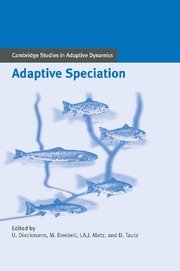Book contents
- Frontmatter
- Contents
- Contributing Authors
- Acknowledgments
- Notational Standards
- 1 Introduction
- 2 Speciation in Historical Perspective
- A Theories of Speciation
- 3 Genetic Theories of Sympatric Speciation
- 4 Adaptive Dynamics of Speciation: Ecological Underpinnings
- 5 Adaptive Dynamics of Speciation: Sexual Populations
- 6 Genetic Theories of Allopatric and Parapatric Speciation
- 7 Adaptive Dynamics of Speciation: Spatial Structure
- B Ecological Mechanisms of Speciation
- C Patterns of Speciation
- References
- Index
4 - Adaptive Dynamics of Speciation: Ecological Underpinnings
Published online by Cambridge University Press: 05 July 2014
- Frontmatter
- Contents
- Contributing Authors
- Acknowledgments
- Notational Standards
- 1 Introduction
- 2 Speciation in Historical Perspective
- A Theories of Speciation
- 3 Genetic Theories of Sympatric Speciation
- 4 Adaptive Dynamics of Speciation: Ecological Underpinnings
- 5 Adaptive Dynamics of Speciation: Sexual Populations
- 6 Genetic Theories of Allopatric and Parapatric Speciation
- 7 Adaptive Dynamics of Speciation: Spatial Structure
- B Ecological Mechanisms of Speciation
- C Patterns of Speciation
- References
- Index
Summary
Introduction
Speciation occurs when a population splits into ecologically differentiated and reproductively isolated lineages. In this chapter, we focus on the ecological side of nonallopatric speciation: Under what ecological conditions is speciation promoted by natural selection? What are the appropriate tools to identify speciation-prone ecological systems?
For speciation to occur, a population must have the potential to become polymorphic (i.e., it must harbor heritable variation). Moreover, this variation must be under disruptive selection that favors extreme phenotypes at the cost of intermediate ones. With disruptive selection, a genetic polymorphism can be stable only if selection is frequency dependent (Pimm 1979; see Chapter 3). Some appropriate form of frequency dependence is thus an ecological prerequisite for nonallopatric speciation.
Frequency-dependent selection is ubiquitous in nature. It occurs, among many other examples, in the context of resource competition (Christiansen and Loeschcke 1980; see Box 4.1), predator-prey systems (Marrow et al. 1992), multiple habitats (Levene 1953), stochastic environments (Kisdi and Meszéna 1993; Chesson 1994), asymmetric competition (Maynard Smith and Brown 1986), mutualistic interactions (Law and Dieckmann 1998), and behavioral conflicts (Maynard Smith and Price 1973; Hofbauer and Sigmund 1990).
The theory of adaptive dynamics is a framework devised to model the evolution of continuous traits driven by frequency-dependent selection. It can be applied to various ecological settings and is particularly suitable for incorporating ecological complexity.
Information
- Type
- Chapter
- Information
- Adaptive Speciation , pp. 54 - 75Publisher: Cambridge University PressPrint publication year: 2004
Accessibility standard: Unknown
Why this information is here
This section outlines the accessibility features of this content - including support for screen readers, full keyboard navigation and high-contrast display options. This may not be relevant for you.Accessibility Information
- 13
- Cited by
